- Home
- T. Kingfisher
Bryony and Roses Page 3
Bryony and Roses Read online
Page 3
CHAPTER FOUR
Bryony woke for the second time and knew that the snow had stopped.
She wasn’t sure how she knew, because there were no windows in the parlor, but something had changed. The house was still silent, but the quality of the silence was somehow different.
Well, I can always tell at home when it’s stopped, without looking out a window. I guess it’s no different here.
Relief swept through her, and a restless desire to be gone. They could leave. When the sun was up, they could find their way to the main road, and be free of this strange house altogether.
“Not that I’m not very grateful,” she said out loud to the house. “I am, truly. You’ve saved our lives. If there’s…um….anything I can do to repay you…”
She trailed off there. It was hard to think of anything that a gardener and her pony could do for an enchanted house. It probably even weeded its own flower beds.
She was eager to be up and going, but before she had even struggled free of the rose quilt and the deep sofa cushions, the smell of bacon hit her.
Her feet took her to the table without any conscious input from her brain. There was more bread, more cheese, and on the plate, neatly arranged on either side of a fried egg, were four strips of absolutely beautiful bacon.
“Oh God,” said Bryony, sinking into the chair. “I’m not made of stone…”
It was thick and smokey and just chewy enough to be marvelous. Pigs would be honored to die if they could be assured of turning into bacon of this caliber. Bryony devoured all four strips and turned her attention to the egg and another loaf of bread.
At last, she leaned back in the chair and let out a contented sigh. She could get used to magic, if it cooked like this.
In a small vase to one side of the table, a rose had spread its petals. With the bacon gone, Bryony could smell its scent—a deep muskiness, as profound a rose scent as she had ever encountered. No other flower in the world smelled quite like that.
Bryony herself was not passionate about roses. Even in Lostfarthing, every cottage had its rosebush, and there were people who devoted every square inch of dirt not dedicated to vegetables to their roses. She wasn’t one of them. A rambler had come with the house and had conquered a section of the back fence, and there was a decent-sized rosebush by the barn that had served as a home to uncounted generations of mockingbirds, but that was as far as it went.
It was perfectly possible, Bryony felt, to have enough roses and want to plant some meadow sage and bee balm to round things out instead.
Still, it was a lovely rose. Her sister Iris might like it. Iris was always bringing cut flowers in from the garden, and she suffered a good bit in spring, during that interminable stretch when the crocus had finished blooming and nothing else had taken its place. Bryony herself felt that the green haze of leaves at the base of last year’s stems was far more glorious than any cut flower, but you really had to be a gardener to appreciate that sort of thing.
It was a magical rose, clearly. Even Bryony’s enthusiastic rambler was only pushing out leaflets and had not manifested any buds yet. Still, all flowers were a little magical, weren’t they?
Perhaps being magical means that it wouldn’t wilt on the way home.
She pushed back from the table and washed her hands in an ewer of water. Then she saddled Fumblefoot. He was feeling frisky—or as frisky as he ever got—and mouthed at her sleeve, looking none the worse for his snowy adventure the day before.
Bryony tidied up as best she could, folding the quilt and stacking the dirty dishes, then pulled on her now dry socks and boots. She surveyed the room. “Well. Thank you again. For the fire and the mash and the bacon. We’re very grateful.” She cleared her throat a little.
There was an unused jar in the saddlebags. She poured an inch of water into it and transferred the rose into the jar. Once she got outside and mounted, she could find someplace to tuck it so that it wouldn’t splash about too badly or get crushed. Iris worried much more than her other sister, and it would be a good peace offering for having been gone all night in the snow.
And admit it—it’s also proof that this happened at all! Because surely no one will believe you otherwise.
The door to the hallway opened at a touch. She led Fumblefoot through it and was pleased (and secretly relieved) to see that the puddles and the pony droppings had vanished in the night.
She stretched out a hand to the door to the entryway.
Something roared.
The sound came from all directions, the echoes battering down the hallway until it was impossible to tell the source. Perhaps the house itself was growling.
Fumblefoot jerked back against the reins and Bryony had to grab for them as the roar came again. The floor seemed to shake and at first she thought that it was an earthquake or an avalanche, for surely such a sound could not come from a living throat. Then it came again and there was a snarling to it and it fell down to a growl that shook her bones and rattled the candlesticks in their silver sconces.
This is it, thought Bryony. This is the price I pay. I knew the bacon was too good to be true. She grabbed Fumblefoot’s reins tightly so that he would not bolt back down the hallway, because the inside of the house must surely be its hunting ground and they would have to go forward if they had any chance of escape.
She shoved hard against the door and it slammed back against the wall. The entryway lay before them.
Through the door we have to get through the door if we get outside perhaps there’s a chance…
The door to the outside was open.
Standing in the doorway, a great black shape against the snow, was a Beast.
“Oh God,” someone said, very quietly. “Oh God, oh God.” Bryony agreed with the speaker very much, but would have been surprised to discover that it was herself. “Oh God.”
The Beast was well over six feet tall and extraordinarily broad. That by itself would not have set him apart from mortal men but his head was set low and forward, like a boar’s, and his heavily muscled neck rose into massive shoulders, covered in a wild mane of hair. The double doors stood wide, but he filled the space and left no avenue through which a woman and a pony could escape.
He roared again. There were words in it somewhere, but all Bryony could hear was the quiet voice saying “Oh God, oh God,” in prayer and terror.
“The rose!” roared the Beast, the white of his teeth a slash against the shadows. “The rose!”
Fumblefoot reared.
Bryony would have sworn on the grave of her mother that Fumblefoot couldn’t rear, the pony didn’t have it in him, but the Beast was nothing any horse could understand. The leather reins left a smarting red line across her palm, and then Fumblefoot had whirled around and was charging down the hallway in a mad dash for escape.
No, idiot, no, you can’t run, you’re not good at it, you certainly can’t run on a carpet with tables everywhere, oh God—
She heard him stumble. His knees were so scarred and broken from his years as a cart horse that he could hardly run in the best of circumstances, but he was up immediately and went blundering and crashing down the hallway.
Her anguish was so great that she had brought Fumblefoot here, that he might not only be eaten up by a monster but that his last minutes would be spent in blundering terror instead of lying down peacefully in the snow, that Bryony snapped her mouth shut. Somewhere inside her was anger, and that anger wrenched her head up so that she stared full into the face of the Beast.
The Beast’s face was somewhere between bear and boar, a long bear’s muzzle with the wicked curves of tusks, a boar’s high and awkward forehead with the heavy brows of a bear. He had dark fur, fine and dense across his face, but the eyes that met Bryony’s were as yellow as fire.
“The rose must not leave,” he growled, and the growl went on and on and filled up the entryway of the house until Bryony was drowning in it.
She dragged her eyes away from the Beast’s face, down the len
gth of her own arm. Her left hand seemed to belong to some other person. Certainly she wasn’t the one holding a jam jar, half-full of water, with a rose in it, was she?
The hand was shaking. The water sloshed in the jam jar, and the rose rolled back and forth on its stem.
She thrust her hand out, stiffly, toward the Beast. “Take it,” she quavered.
The Beast spoke over her head, as if to someone on the ceiling. “How dare you?” he growled. “You dare—you dare—”
It would have been very pleasant to stay detached. Perhaps if you weren’t quite there, being eaten by a monster didn’t hurt so much. But unfortunately she seemed to be regaining her wits and her hand undeniably did belong to her.
“I’m sorry,” she said. “I didn’t know it was your rose. That is, I knew it was, I didn’t know you cared about it. It’s just a rose. There was cheese and bread and bacon, too. I ate that. I’m sorry. I thought I was supposed to. I can’t give that back. Well, I could, but you probably don’t want it now. Please don’t kill me?”
She ran out of breath and stared back up at the Beast, who was gazing down at her with narrowed yellow eyes.
Perhaps her apology had mollified him a little, because when he spoke again, the growling had subsided to a low rumble. Bryony could feel it through the soles of her feet. “I do not care about the rest. Only the rose.”
She said nothing. She could not think of anything else to say. Her legs were shaking and the shaking was traveling up her spine and into her stomach and she thought in a moment that she might be sick.
“Give it to me,” said the Beast.
She held out the jam jar. She could not have taken a step towards the Beast to save her soul, but she leaned far forward, clutching the doorjamb for support. The water was still sloshing, and it sloshed harder as the Beast stepped forward to take it.
He loomed over her. Most of the light and all of the air in the room seemed to vanish. Bryony fought to breathe.
She felt that strange swimming detachment again, as his hand came toward hers, and settled over the jam jar. His fingers were three times the size of hers, and ended in blunt black claws.
He was wearing some kind of robe with long, loose sleeves. It seemed to Bryony that the Beast was very careful to keep from touching her, but the cuff of his sleeve brushed across her wrist.
“You will have to open your hand,” said the Beast, in a low rumble, although he was perfectly capable of wrenching the jar from her hand, or her hand from her wrist, if he so chose.
“Ah,” said Bryony. “Yes. Of course.”
She opened her fingers. The Beast took the rose.
“Right,” said Bryony, and fainted.
CHAPTER FIVE
When she woke, she was in the parlor again, on the sofa. She opened her eyes, saw a dark humped shadow crouched by her side, and closed them again immediately.
“I never faint,” she said aloud. “I consider it revolting. I have no patience for women who faint.” She pinched the bridge of her nose between her fingers.
“On the contrary,” rumbled the voice of the Beast, “I felt that your skull bounced most charmingly on the carpet.”
Perhaps she was having a nightmare, or an extended hallucination. Perhaps she was freezing to death in the snow even now, and this was a last fevered dream before she died.
Yes. That made a great deal more sense than that she was trapped in an enchanted house with a Beast who had roared at her and now had apparently decided to mock her.
“And the way in which you soiled yourself with terror was graceful in the extreme,” added the Beast.
Bryony’s eyes flew open and she sat bolt upright, ignoring the ringing in her ears and the immediate stabbing pain behind her eyes. “I did not!” she cried, and then the smell hit her, and she realized that she had.
“It is not right that I am going to be both dead and mortified,” she told the Beast. “Either kill me now or give me a change of underwear.”
He was kneeling down, which put his head on a level with Bryony’s. His golden eyes were cool and sardonic and amused.
“I am not going to kill you. And I fear that I do not carry women’s underwear about my person.”
“You are not a gentleman!” cried Bryony. It was not that she was too furious to be afraid, it was that the fury was sitting on top of the terror and riding it like a horse.
“No,” he said. “I am a Beast.” He made a restless motion on the cushions with one clawed hand, and Bryony gulped.
She was going to have to look at him. It would be too obvious if she wasn’t looking at him.
She looked. He was still a Beast. His face was an animal’s face, but like no animal she had ever seen.
It’s fine. It’s fine. Don’t be rude. That’s how he looks. He hasn’t killed you yet.
She would have said something else, whether to apologize or to insult him or to continue to beg for her life, when a thought struck her and drove everything else from her mind.
“Fumblefoot! Oh Lord—” She grabbed the back of the couch to haul herself upright.
The Beast rose gracefully to his feet and stepped out of her way. “If that is the name of your—for want of a better term—horse, he is unharmed. The house stopped him and is feeding him carrots.”
It was strange how the Beast referred to the house, but as it was not so different from how Bryony herself had been thinking of the enchanted manor, she let it pass. “He was afraid,” she said, feeling a bizarre urge to defend the wretched pony. “He is not much to look at, I admit, but he’s had a hard life.”
“Haven’t we all…” said the Beast dryly. He gazed down at her, then sighed, a sigh like a horse or a cow or some other large animal, not like a human.
Well, perhaps not quite like a cow.
“I believe we have gotten off on the wrong foot,” said the Beast. “I am sorry.” He bowed, with both hands clasped in front of him. “Why have you come here?”
“It was the rutabagas,” she muttered, trying to assess the state of the damage to her underwear and trousers, which was considerable.
The Beast’s eyebrows were round patches of light-colored fur, rather like those of a dog, but they shot upward very expressively.
“Rutabagas?”
Bryony put her face in her hands. There was no salvaging her dignity. She had fainted and then wet her pants, and while the Beast seemed increasingly disinclined to eat her—perhaps he didn’t like his prey marinated in their own urine—she still did not know what he intended. She wanted to leave, even if it meant riding home on a damp saddle.
Still, he’d asked. So she told him about the rutabagas, and the freak snow storm, and getting colder and colder and then finding the road.
“Ah,” said the Beast. “Yes. If a traveller’s need is great, they sometimes find their way here. It is part of the magic at the heart of this place. One of the magics, in any event. So that explains that.”
He frowned. Bryony, who had almost managed to watch his eyes and not the rest of his monstrous features, shuddered. There were a lot of teeth encompassed by that frown.
“But you should not have taken the rose,” said the Beast, with a hint of a growl.
“Then maybe you shouldn’t have left it on the table,” said Bryony.
The Beast inhaled sharply.
Oh, that was brilliant. Yes. Antagonize him. That will end beautifully.
Perhaps she could talk him into letting Fumblefoot go. The pony might be able to find his way home, and then at least her sisters would know something had happened to her.
Although they’ll have no idea what. And how could they even begin to guess?
“Rutabagas. Hmmph.” The Beast turned and stalked across the room to the fireplace. He stared into the fire for a moment, and said, without turning, “You are a gardener, then?”
“Yes,” said Bryony.
“What do you know about roses?”
Bryony exhaled. “They’re a lot more trouble than they’re worth.�
�
A strange sound came from the Beast, and his massive shoulders shook. It took her a moment to realize that he was laughing.
“I mean it,” said Bryony, nettled. “They get black spot and mildew and cankers and rust. I don’t know why anyone bothers with the fancy types. They smell nice, sure, but they take ten times as much work as anything else in the garden. I prefer sages. Nothing bothers a sage.”
“Or a rutabaga?”
“Don’t talk to me about rutabagas,” said Bryony grimly. She wondered if she could towel herself off with one of the napkins on the table. “Do you plan to keep me here talking, er, my lord?” She wasn’t sure what to call him. My lord seemed safest.
“I am afraid,” said the Beast, turning back toward her, “that I plan to keep you here permanently.”
Bryony stared at him fixedly, focusing on the bright yellow eyes. Her mind was numb.
“Because of a rose?” she forced out.
“Yes,” said the Beast, “though not quite the way you think.”
She put her hands to her face and gave a strangled laugh. “Imagine if I’d nicked the silverware!”
“Would you like to nick the silverware? We have a great deal of it.”
“But not of roses, apparently!”
“I am sorry,” said the Beast. “I have need of you.”
“But I cannot stay with you,” she said. “My sisters—the garden—they’ll starve! And my plants—”
She loved her sisters very much and would have died for them gladly, but the thought of losing her garden, the long rows of vegetables and the wild edging of herbs and flowers, the great purple sprays of lavender and the soft fuzz of lamb’s ear—that was a loss so great she did not have words to wrap around it.
“They’ll starve,” she said again, because she knew that only a gardener would understand her other grief, and there was nothing about the Beast to give her hope. “I am the one who grows all the vegetables—”

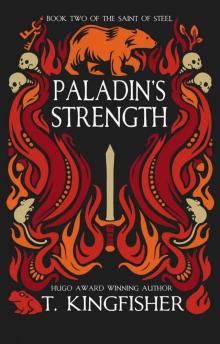 Paladin's Strength
Paladin's Strength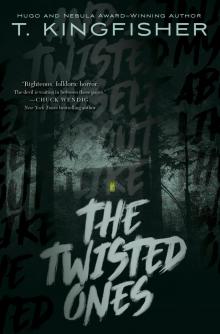 The Twisted Ones
The Twisted Ones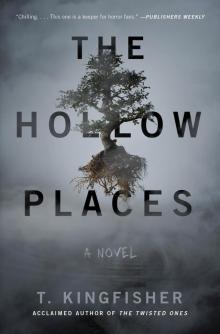 The Hollow Places
The Hollow Places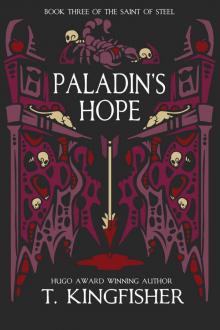 Paladin’s Hope: Book Three of the Saint of Steel
Paladin’s Hope: Book Three of the Saint of Steel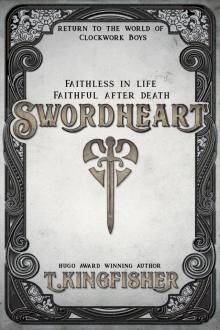 Swordheart
Swordheart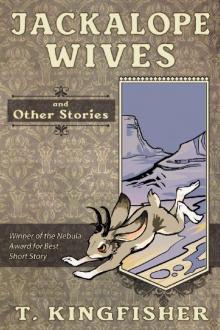 Jackalope Wives And Other Stories
Jackalope Wives And Other Stories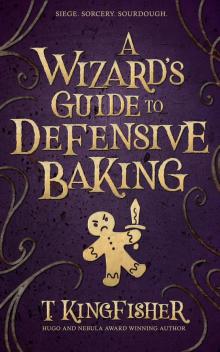 A Wizard's Guide to Defensive Baking
A Wizard's Guide to Defensive Baking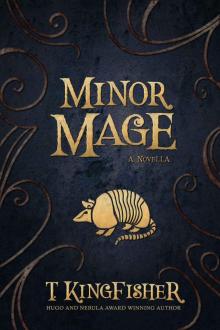 Minor Mage
Minor Mage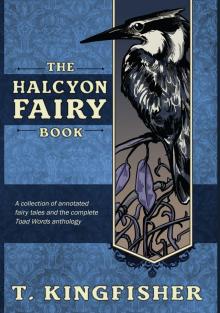 The Halcyon Fairy Book
The Halcyon Fairy Book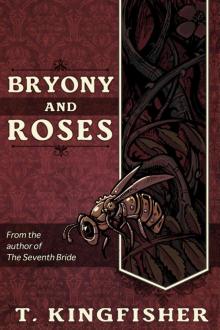 Bryony and Roses
Bryony and Roses The Wonder Engine_Book Two of the Clocktaur War
The Wonder Engine_Book Two of the Clocktaur War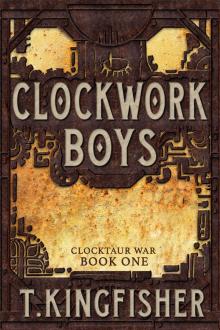 Clockwork Boys: Book One of the Clocktaur War
Clockwork Boys: Book One of the Clocktaur War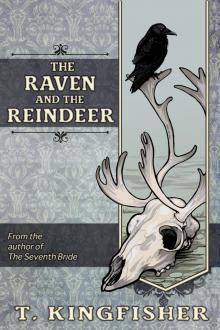 The Raven and the Reindeer
The Raven and the Reindeer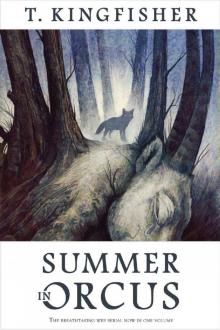 Summer in Orcus
Summer in Orcus The Wonder Engine
The Wonder Engine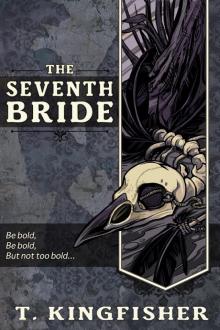 Seventh Bride
Seventh Bride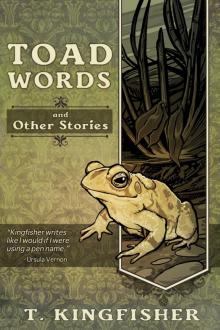 Toad Words
Toad Words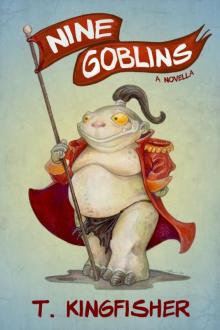 Nine Goblins
Nine Goblins